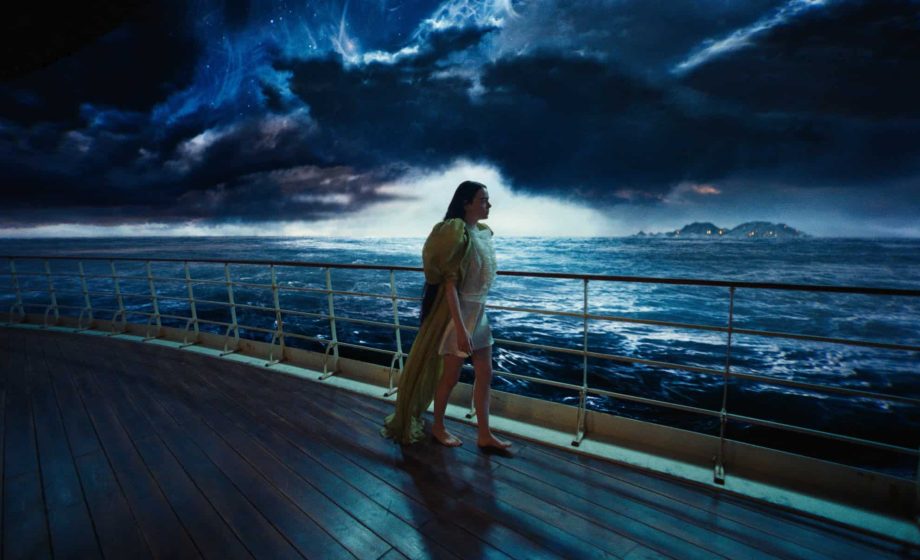2023 was a ripe year for cinema—one need only look at the truly all-consuming cultural event that was Barbenheimmer to see that. Both films offered two entirely different experiences that somehow shared much of the same existential heart and seemed slated to be the contenders for best film of the year. But just as the year came to its close, along came an offering that has turned heads—and opinions—with its truly unique experience: Poor Things.
Poor Things, directed by Yorgos Lanthimos (The Lobster, The Killing of a Sacred Deer) and both produced by and starring Emma Stone, is an absolutely electric affair of joy, loss, sex, and introspection. Its story—whose screenplay was written by Tony McNamara based on the novel of the same name by Alasdair Gray—is an exploration within the framework of Frankenstein. We follow the creation Bella Baxter (Emma Stone), a woman reanimated by Godwin “God” Baxter (Willem Dafoe) after a suicide attempt. As Bella’s mind grows rapidly, so too does her interest in the world’s offerings. Across her globe-trotting journey her mind becomes sharper and her experiences more broad, but all still centre around growing questions of humanity, love, purpose, mortality, and sexuality.

What is most thematically striking first in Poor Things is the bluntness of its sexual content. A key component from the start, it is handled in a manner that is all at once erotic, mundane, absurd, and humorous. With a recurrent theme of womanhood and parenthood, it is a logical concept to recur, but it is rare to see it handled in such an evocative manner without existing for cheap thrills. Bella navigates the entire spectrum of understanding one’s own sexual being from (metaphorical) inception through to a point of contemplation few allow themselves, using the pitifully wretched playboy of Duncan Wedderburn (Mark Ruffalo) and a rotating door of individuals as a mirror to knowing herself.
Equal in surprise and delight is the film’s use of a fantastical history and anachronistic elements. It is subtly and slowly revealed that this is not the Victorian age with minor technological wonders sequestered to the Doctor we come to expect of our Frankenstein stories; steampunk-like inventions soon emerge—a motorized carriage with horse figurehead, city-wide gondola systems, fantastical luxury cruisers—that paint an uncanny world just different enough from history to captivate with great ease.

These seemingly out-of-place surprises are truly the magical blood flowing through Poor Things and are by no means contained only to visual world-building elements. In the script and many of the actors’ performances there are modern turns of phrase—most notably Wedderburn’s near-constant swears and cries of frustration—that pull one deeper into each conversation. Stone and Ruffalo wield these modern flares with ease and intrigue, and the film’s setting and events cater beautifully to them, a furious, impassioned, and timeless ballroom dance scene exemplifying this tactic.
There are aspects of these surprise stylized elements that at times can jar further than feels necessary. Godwin burps up massive, floating bubbles of self-inserted bodily fluids. The horizon is a lurid collection of contrived colours. Bella’s outfits often resemble flamboyant anime costumes brought to life in the wrong genre. Yet each of these elements works so splendidly in the context of this twisting reimagining of a classic tale that it is hard to find fault in their use. It is the journey of an innocent into a strange new world, and Lanthimos has found myriad ways to make it feel as such and to remind us just how odd, frightening, and beautiful our world can be to new eyes.

Poor Things is not a revolutionary film. It is not doing something entirely unheard of within the forum it presents itself. It is not changing how we will do and view film from now on. But despite that, it feels so entirely new, a spectral breath of fresh air that sits somewhere between the spectacle of modern blockbusters and the claustrophobic indies. One can’t help but feel a similar adoration and appreciation to the sleeper hit of Everything Everywhere All at Once—we are being given the gift of profound and absurd existential entertainment in our cinema, and it is a gift most enthusiastically accepted.





